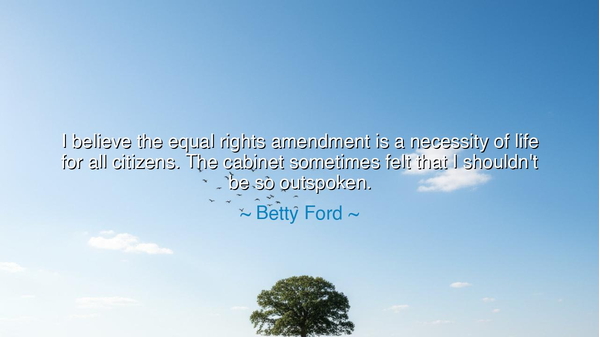
I believe the equal rights amendment is a necessity of life for
I believe the equal rights amendment is a necessity of life for all citizens. The cabinet sometimes felt that I shouldn't be so outspoken.






The voice of Betty Ford rings through the corridors of history with courage and clarity: “I believe the equal rights amendment is a necessity of life for all citizens. The cabinet sometimes felt that I shouldn't be so outspoken.” These words were not spoken in a time of ease, but in an era when women were still pressing against the iron doors of inequality. The Equal Rights Amendment (ERA) was more than parchment and ink—it was a cry for justice, a vision of balance, a promise that the gifts of liberty should not be divided by gender. In Ford’s voice, we hear not merely a political stance, but the eternal call of justice that no cabinet, no council, no chorus of disapproval could silence.
In her words, we see two forces colliding: the necessity of equality and the fear of power disturbed. For to demand equal rights is to stir the settled dust of tradition, to awaken those who have long slept in the comfort of dominance. Betty Ford, as First Lady, could have remained silent, as many before her had. She could have lived in the shadow of her husband’s office. Yet she chose to speak with fire, knowing well that her candor unsettled powerful men. She knew the cost of her boldness, but she also knew the greater cost of silence: the continued suffering of those denied the fullness of their humanity.
History gives us countless sisters in her struggle. Consider the life of Susan B. Anthony, who defied the law and cast her vote in 1872, knowing she would be arrested for her act. Like Betty Ford, Anthony heard the voices urging her to quiet, to retreat, to accept things as they were. Yet she, too, believed equality was not a luxury but a necessity. Her arrest, and her words at trial—“Resistance to tyranny is obedience to God”—were the seeds of a harvest that Betty Ford and others would later carry forward. Both women faced reproach, but both understood that being outspoken in the face of injustice is not shame, but sacred duty.
Ford’s declaration reminds us that equality is not granted by the goodwill of rulers, but demanded by the persistence of the people. The ERA was not merely a legislative proposal; it was the embodiment of centuries of struggle. Women had labored in silence, raised generations, worked in fields and factories, yet were denied equal protection under law. To call this amendment a “necessity of life” was to proclaim that justice is as vital as bread, as air, as water. Without it, the soul of a nation starves.
But let us not mistake outspokenness for rebellion without cause. Ford’s boldness came not from hatred of men, nor from scorn of order, but from love of justice and faith in democracy. She understood that silence serves the oppressor, but speech, even when unwelcome, can plant seeds of transformation. The ancients remind us: the prophet is never welcome in her own house, yet her words outlive the walls that sought to contain them.
The lesson for us is simple yet profound: do not silence your voice when truth burns within you. If councils, cabinets, or communities tell you that you should not be so outspoken, know that your silence may preserve their comfort but it will betray your soul. Speak, though it shakes the walls. Speak, though it unsettles friends. Speak, though history has long ignored your kind. For it is in speaking that the tide of change is stirred.
Practical wisdom demands this: if you believe in justice, act with it daily. Treat men and women with equal respect in your homes, your workplaces, your gatherings. Support those who still press for laws that protect the weak from oppression. And most of all, encourage the voices of the bold—those who speak when silence would be safer. For without such voices, progress falters, and the chains of inequality grow heavier with each generation.
So let Betty Ford’s courage be your inheritance. When you are told you should not be so outspoken, remember that the world changes only because someone refused to hold their tongue. Let your voice rise with wisdom, with compassion, and with unyielding fire. For equality is not a gift to be granted—it is the breath of life itself, and to withhold it from any citizen is to rob all of humanity of its fullness.






AAdministratorAdministrator
Welcome, honored guests. Please leave a comment, we will respond soon